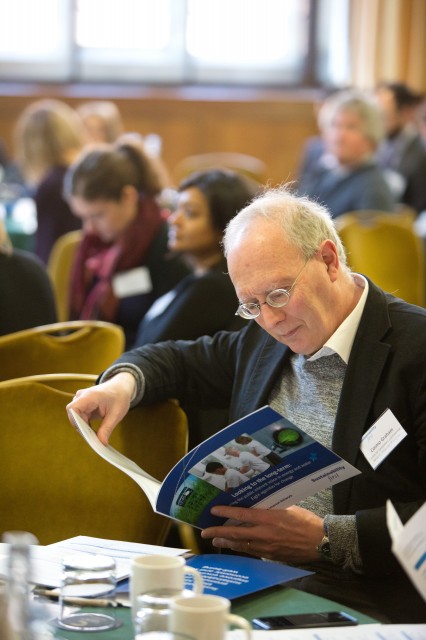On the 28th of February representatives from over 25 organisations battled through the Beast from the East's snow to attend the final New-Pin conference at Church House in central London.
This major conference represented the culmination of a 3-year-long project, aiming to build a stronger pubic interest voice in the energy and water sectors. Speakers included Emma Howard Boyd, Chair of the Environment Agency, and David Gray, Chair of Ofgem.
In this period of great upheaval, coherent and joined-up thinking has never been more essential. The challenges represented by the low carbon transition, climate change and the polarised political mood, as well as the huge societal shifts caused by digitisation, big data and artificial intelligence, mean that decision makers need to work more collaboratively and look to the long-term to ensure that the future energy and water systems work for everyone, not just today but also for an increasingly uncertain world tomorrow.
The New-Pin project has sought to identify 'legitimate' outcomes by bringing together energy and water stakeholders with a variety of different perspectives and interests -including energy and water companies, regulators, government, academics and public interest groups[1]— to begin to create a shared language and build consensus.
The project has focussed on a democratic, deliberative engagement process, enabling New-Pin members to have discussions on 'hard' public interest topics in a safe and constructive environment and in the process unlock more innovative approaches to change.
Change needs to be done "with" people rather than "to" people if the sectors are to be seen as legitimate and the demand side flexibility and innovation that we need are to be unleashed
Sharon Darcy, Director, Sustainability First
As part of this process, the New-Pin project has created a working definition of the public interest, centred around six desirable long-term outcomes: value for money, quality services, clean services, resilience, place-based wellbeing, and fairness – within and between generations.
Sharon Darcy, Director of Sustainability First, said:
'It is vital that decision makers in companies, regulators and government keep focused on the long-term public interest outcomes that New-Pin has identified as they, and the public, experience significant change.'
The findings from the New-Pin discussions are summarised in the final New-Pin project report, 'Looking to the long-term: hearing the public interest voice in energy and water' which was launched at the conference, and can be accessed here: https://goo.gl/4f9eTj.This is backed up by eleven in-depth project papers, available on the Sustainability First website (www.sustainabilityfirst.org.uk).
Key conclusions centre around early planning for the distributional impacts of large-scale disruption, which will likely need to be tackled by a combination of market-led and regulatory approaches to deliver the innovative services that will deliver the desirable public interest outcomes. The need to build trust and legitimacy and the importance of an active demand side were also identified as vital.Stakeholder engagement and corporate governance - where boards meet the needs of their customers, future consumers and wider stakeholders - are important here.
'Change needs to be done "with" people rather than "to" people if the sectors are to be seen as legitimate and the demand side flexibility and innovation that we need are to be unleashed,' said Sharon.
To help with this, the final New-Pin report contains 8 'agendas for change' for decision-makers in energy and water, as well as 8 'levers for change'- practical, extensively road-tested sets of principles, decision making guides and infographics designed to help structure discussion in this area.
Another key output is a board effectiveness checklist, which is already being used by members of the New-Pin network to ensure the long-term public interest is embedded in their corporate governance.
Now the New-Pin discussions are concluded, Sustainability First hopes that decision-makers across the two sectors will begin to use these tools to work towards real change in their organisations. As the final report highlights:
'This isn't a "black box" that is too difficult to open. The New-Pin agendas and levers for change are in your hands.'
Sustainability First is excited to continue the work of the New Pin project with its follow-on project, Project Compact, which launches in May.
[1] Members of the New Pin project group included: Ofgem, Ofwat, WICS, the EA, the NIC, BEIS, Defra, Citizens Advice, Which?, CCW, CCG Chairs, CSE, Waterwise, Green Alliance, WWF, ShareAction, the LGA, The Energy Group at Exeter University, The CCP at UEA, Electricity North West, npower, Northern Powergrid, WPD, SSEN, Affinity Water, Anglian Water, South East Water, Southern Water & United Utilities


